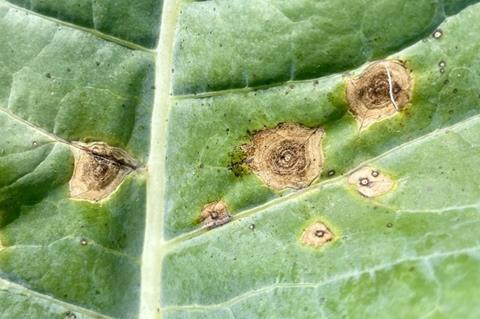A new study found evidence that commercial broccoli seeds can harbor a fungal seedborne pathogen, Alternaria brassicicola, with cross resistance to 2 commonly used fungicides. The finding highlights the need to include fungicide resistance screening in seed health testing programs where appropriate and practical to improve sustainable disease management. The study was published in Applied and Environmental Microbiology, a journal of the American Society for Microbiology.

“Our study highlights the importance of seed health testing for the presence of A. brassicicola in brassica seeds, particularly broccoli,” said corresponding study author Bhabesh Dutta, Ph.D., professor and extension vegetable pathologist at the University of Georgia. “This will help to remove contaminated seedlots and potentially reduce dissemination of fungicide resistant isolates locally as well as globally. Ideally, incorporating screening for the presence of the pathogen along with their fungicide profile would greatly improve the quality of seed health testing and promote high-quality seeds available for our growers.”
A. brassicicola is resistant to commonly used fungicides and affects the quality and marketability of broccoli heads, especially during warm and humid weather. In recent years, growers have seen reduced efficacy of fungicides for broccoli crops, which raised concern about the emergence of issues linked with resistant fungal populations. In the new study, the researchers tested the efficacy of 3 commonly used SDHI (succinate dehydrogenase inhibitor) fungicides that are commonly used by growers to manage this pathogen: boscalid, penthiopyrad and fluopyram.
Commercial seeds
The researchers screened commercial seeds of 2 commonly grown broccoli cultivars for the presence of A. brassicicola. The pathogen isolates were screened against the 3 commonly used SDHI fungicides under in vitro conditions. First, the researchers performed a lab-based assay to screen the isolates with different doses to evaluate their sensitivity. Then they examined the fungus at the molecular level by looking at mutations in SDHI genes known to be linked to fungicide resistance.
They found that seeds can act as a carrier of A. brassicicola with resistance to boscalid and penthiopyrad, indicating potential introduction of fungicide resistance via seeds. Some of the seed isolates were also resistant to a commonly used fungicide with a completely different mode of action (Quinone-outside inhibitor; azoxystrobin).
This is the first report of the occurrence of multiple fungicide resistance in A. brassicicola from naturally infested seeds. The researchers also found that 93% of the pathogen population that displayed resistance at the phenotypic level also had point mutations that confer resistance to boscalid and penthiopyrad. This strong link between lab results and genetic markers confirms that resistance could potentially be widespread and likely stable in the population.
“These findings demonstrate that seeds can serve as a source for the potential introduction of resistant fungal populations in areas where these fungicides have never been used, resulting in reduced options for growers,” Dutta said.
Screening tool
Based on the mutation the researchers discovered, the scientists developed a PCR-based allele-specific assay that can be used for rapid detection and monitoring of fungicide resistance. “This tool can help regulatory agencies and seed industries to detect SDHI-resistance in seedborne A. brassicicola and make informed decisions early,” Dutta said.
Dutta’s lab group led the study with post-doctoral associates Navjot Kaur, Ph.D., and Anoop Malik, Ph.D. This study was part of a multistate U.S. Department of Agriculture and National Institute of Food and Agriculture project on Alternaria leaf blight and head rot in broccoli funded through the Specialty Crops Research Initiative Program (USDA NIFA SCRI; 2020-51181-32062).







No comments yet